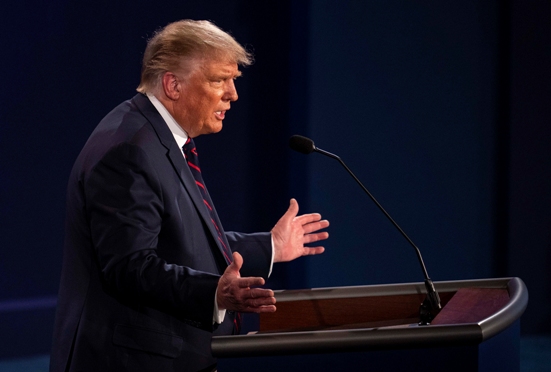Trump burns the first debate down
By James Poniewozik
“This is not going to end well,” President Donald Trump said in the last section of Tuesday (29) night’s debate.
This was an unusual way for a president of United States to describe an election in which he is running. (He was in the middle of a misleading rant aimed at undermining faith in mail balloting.)
But as a description of the belligerent, ear-splitting, deeply depressing first debate between Trump and former Vice President Joe Biden, he was dead on. It didn’t end well. It didn’t begin well. And the parts in between were pretty lousy, too.
And that seemed to be very much the president’s strategy.
The advantage to being the one who derails a debate is that people assign symmetrical blame for asymmetrical behaviour. They throw up their hands and complain about the bickering from “both sides.”
So let’s be clear here: If the first debate was a dumpster fire, it is the president whose hands were stained with kerosene.
Trump has always approached debates like a guy in a bar fight looking for a bottle to break. But in the Cleveland studio, the COVID-19 pandemic had the effect of locking up the barware and cutlery. The audience — which he’s used in past debates to invite stunt guests, incite reactions and feed his energy — was small and quiet. The physical contact was minimal, so he couldn’t lurk and loom.
Instead, he looked within himself. Specifically, to his vocal cords. Trump, who has always viewed politics as a reality-TV display of dominance, fought the debate as if it were being scored by volume and number of sentences interrupted.
There were important issues on the agenda — the pandemic, the wounded economy, climate change. But Trump was mostly determined to drown them, and his opponent, and even the moderator, out.
As for the challenger, by the standards of any other debate in the TV era, Biden’s remarks would have been shocking. He called the sitting president a liar and a fool, a racist and a clown. He told him, at one point, “Will you shut up, man?”
But the America in which Biden once dismissed a Paul Ryan argument with a wry “malarkey” is ancient history. He was now, like everyone in public life, a character in the reality show that the president has been programming for four years.
Tonally, the challenger wanted to show he could stand up to a bullying, brawling debater, and to make the case that he would be a steady alternative to a constant earthquake of a presidency.
One goal would seem to contradict the other, but amid a Spinal Tap debate that went up to 11, maybe stopping at 10 counts as gravitas.
Biden also needed to avoid a repeat of his worst performance of the campaign, in his first Democratic debate, when Sen. Kamala Harris — now his running mate — challenged his record on school segregation. Then, Biden seemed surprised, abashed and unprepared.
This time, Biden was facing an opponent who does not merely telegraph his punches, he windmills his arms, blows a trumpet and sends out a news release. Trump had for weeks dismissed his opponent as slow and foggy. He was obviously going to come out hard, trying to make him seem scattered and shaky.
Biden was not that. Where Trump relied on the jabs and improv he once used on Hillary Clinton, Biden had crafted lines: “It is what it is,” he said, repeating Trump’s notorious line about the pandemic’s death toll, “because you are who you are.”
He didn’t match Trump’s volume. He often lost control of their exchanges. And the cross talk mostly kept him from building the emotional pitches to the audience that he relies on.
But both men were embodying their campaign pitches through their style. Trump wanted to show himself as the dominator who fights for the last word. Biden wanted to make the president into the blaring radio that America begs someone to turn down.
The moderator, Chris Wallace of Fox News, did not seem nearly as prepared. He said before the debate that he planned to be a low-key presence, refraining from fact-checking and letting the conversation unfold on its own. And the same thing happened to him that happened to everyone else who made plans in 2020.
Wallace left the debate stage with tire tracks down his back. To his credit, he started talking back quickly, and — surprisingly for a host from the Trump-friendly cable network — made clear that to the president that “Frankly, sir, you’ve been doing more interrupting.” (Trump then interrupted him.) But he was powerless to do much but interject, “Mr. President!” over and over.
What will people remember about this debate? Maybe the duelling rounds of blame on the pandemic, in a broadcast changed by that pandemic. (No handshakes, no spin rooms.) Maybe the president’s failing to condemn — white supremacy and telling the violent far-right group the Proud Boys to “Stand back and stand by.” (The line delighted the group’s members online.)
But mostly, the first debate of 2020 was proof of how much we’ve become inured to since the then-stunning first debate of 2016. Even the phrases that TV anchors used for it afterward — “train wreck,” “food fight” — felt overused and inadequate by now. (CNN’s Dana Bash was most vivid, using a phrase one letter removed from “hit show.”)
The best thing I could say about this debate is that in its cacophonous way, it was an argument, through the two candidates’ styles, about what kind of country we want to live in.
But it was also a clear, dismal and deafening reminder of what kind of country we actually do live in.
-New York Times


